Corrected on 2 May 2012, 11.45am
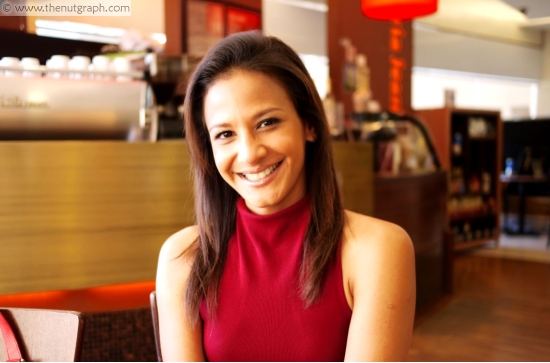
A SELF-CONFESSED “news junkie”, Joanne de Rozario is a familiar face to Malaysians because of her love for the news. (Corrected) She currently hosts The Breakfast Show with Aishah Sinclair, Nazrudin Rahman and Hansen Lee on ntv7, where she was the TV station’s head of production for the news and current affairs department from 1997 to 2003.
She also hosts The Link on HD lifestyle channel Li TV, serving as executive producer. And she produces Malaysian content for E! News Asia and has delved into independent filmmaking – she produced the award-winning music documentary Laya Project.
Calling herself a true “Federal Territory and Selangor girl”, de Rozario has fond memories of the Malaysia she grew up in, and big hopes for the country she thinks it could be. In an interview on 1 Feb 2012 in Petaling Jaya, she tells The Nut Graph that she thinks there are more things to be grateful for than to complain about when it comes to Malaysia.
TNG: Where were you born?
I was born in University Hospital, Petaling Jaya in 1975. But I grew up in Ulu Klang, so I am very much an Ampang kind of girl. Ulu Klang is where my family built their house. My dad was in the military and he used to be transferred to many different places, but I used to say I would always want to go home, to that house.
What was life like in those days? What are your earliest memories?
When my parents bought that piece of land in the 70s, there was nothing there. It was a new area but as I grew up, there were Taman Melawati and other parks. I remember my Malay [Malaysian] neighbour Eda and I spending our evenings at the playground at the end of our street. And I would get in trouble for coming home late. I miss the old parts of KL because there were empty plots and acres and acres of land – it was a lot of space that you don’t get a lot of in the city these days.
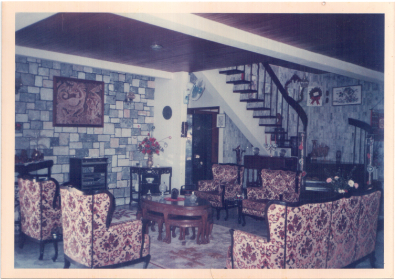
I remember a lot of parties and entertaining in our old house. I also remember my paternal grandmother’s house in Brickfields in a little village in the centre of it all. As a kid I didn’t really appreciate it but it was a really different kind of house with cement floors, the old pounders and all that traditional food. Hanging out there is one of my favourite memories.
Where do your parents come from? Can you trace your lineage?
I have a very peculiar lineage, I suppose. My background is Portuguese and Dutch, but both mum and dad were born in Malaysia. Dad was born in Seremban while mum was born in Kuala Lumpur. Both grew up in the Klang Valley. My paternal grandparents worked with the railways, so my dad grew up in KL.
On my dad’s side, we are Portuguese but I’ve not traced the lineage yet. My mother is Portuguese Dutch and we traced it to at least four or five generations. She also has Sri Lankan blood and has “Lee” in her name. It’s the Sri Lankan “Lee”, not the Chinese surname. My grandfather’s name is Samuel Green Lee.
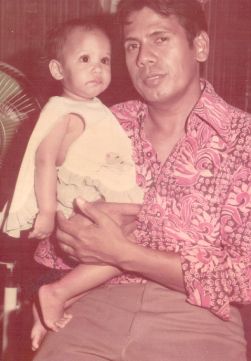
There were times when my cousins on my mum’s side and I would sit down and try to draw out our family tree. And a few years ago, I found out that they are not actually my cousins. I am their aunty, even though they are older than me!
So how did your identity as a Malaysian come about?
In school, teachers could never pronounce my name. I would get called things like Joanna Durian, Joanna Rozana and all sorts. And I used to go, “Whatever (name) you want it to be.” And then I went to college in the US, where people would get really confused because I had a Spanish name but I was from Malaysia. So a lot of it was explaining to people how it all worked in Malaysia.
Even today I have to explain to friends why I’m what you call a Eurasian, but I’m Malaysian. It is very interesting hearing other people’s perceptions. It was not so much a problem in Malaysia because people would never question my nationality or ethnicity. But sometimes when it comes to that race option on the immigration forms, I want to cross out everything and write “human”.
I used to question why I had to tick “Others,” but in my mind, I would think I was special. But still I ask, “Why is race important?”, you know?
And how does that affect you now? We still deal with issues related to race.
I think that we do live in harmony but there are still undertones of racial discrimination, if you want to call it that. Because I am of a variety of mixes, I don’t feel as affected by it. I actually have bumiputera status because of the Portuguese heritage. So to a certain extent, I have some benefits. But otherwise …
Do you remember any stories or advice from your parents or grandparents?
Those in my generation would probably remember reading maybe two paragraphs on 13 May in our history books. I had two friends come over for lunch with our family about a year ago. One of them was a British citizen. He asked my mother about 13 May and what really happened. It was only then that I heard these unbelievable stories, and I remember thinking, “Crap, this happened to my country?” I never knew.
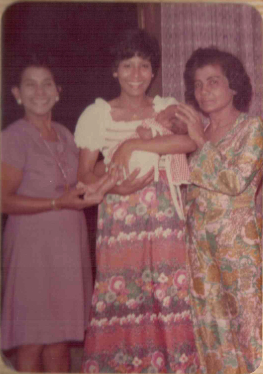
What stories did she tell?
Some of the stories were dreadful. She said there were people who were literally shot at their front doors simply because you could not even step out of your house during curfew. She saw people being murdered. With the country we live in today, you could never picture that happening. She was scared – everyone was.
That was a little bit of an eye-opener for me – that one cannot take the security we have now for granted. Because (my family) were not Chinese or Indian [Malaysian], I suppose they felt a bit safer because they could not be identified. But they were very much part of it – they just did not want to take sides.
I really have fond memories growing up in KL. I don’t think my family ever had to deal with racial tension. But I know my mother sent me to a primary school which was not one of the top schools like Convent Bukit Nanas or St Mary’s (Editor’s note: de Rozario only went to St Mary’s for her secondary education), even though we lived nearby and could have easily entered those schools.
She later told me it was because she wanted me to grow up knowing what it was like not to have everything. You saw a lot of kids who could not afford shoes or books, and I appreciated the fact that my mum did that so I would not take these things for granted.
What are some of the things you worry about in Malaysia today? What gets you?
One is media censorship, because it does happen. We report what we get, but there are certain times when statements are made and we cannot put it out there or one cannot freely comment. For example, we do a breakfast show where opinions and different views matter. But we had a host fired over an opinion, and that opinion was actually backed up by fact. Granted, we are not as bad as China or some other countries, but I think we need to be given freedom so journalists can be real journalists.
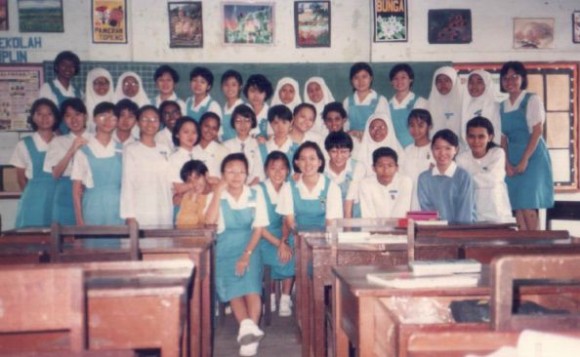
Another thing that really worries me is the level of education in this country. I often wonder what exactly is being taught in schools these days. One university lecturer we had on the show told me that some of her entry-level students, fresh out of secondary school, call the thumb a “mother finger”, because it is “ibu jari” in Malay.
And what makes you hopeful about this country?
There are some brilliant people in the country, whether they are in biotechnology, design or other fields. People do not realise that Malaysia is not only rich in its culture but its research and technology. There are scientists looking for a cure for AIDS in Sarawak, for example.
Yes, we all have our complaints, but we are not focusing on the good things. Aside from what I think are really dumb decisions that are sometimes made, what is there to complain about? The economy is not collapsing like in Europe and the US, and we have a stable government although sometimes it can be one-sided.
I think we have to compromise in Malaysia. I had a huge argument with an expat who argued against letting one race get more than [the others]. And I said those are just some of the things we have to live with if we want to enjoy what we do and have some sort of stability. And he argued further, to which I said: “What do you want? A revolt?” Some people could accuse us of being lazy and not fighting for our rights, but it is just a compromise at the end of the day. And I told him if some people do not like it, they are more than welcome to leave.
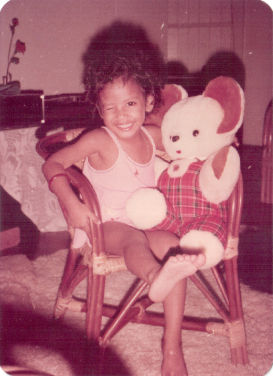
But this “take it or leave” argument, some would say it is unfair. This is their country, why should they go? Where would they go?
Yes, perhaps it is unfair. [And] yes, where would you leave for? It’s definitely not fair, but I think what we have at the moment is worth staying for. Just look around us. Bangkok has gone through so much tragedy and upheaval; and as much as I love Singapore, the country is very sterile and has no soul.
I think what is good is that as much as some parties have tried, things are not swept under the carpet in Malaysia. People realise that even though we have perceived harmony and goodwill, deep down inside there is some sort of racial discontent, and people will stand up and fight for their rights. How we resolve it and offer solutions is very important. I hope (Prime Minister Datuk Seri) Najib Razak delivers on his promises, such as the repeal of the Internal Security Act and others.
The problem in this country is that we talk a lot but don’t necessarily enforce or [implement]. I also hope that we get ministers who absolutely care about what they are doing and are not doing it for just the paycheck.
The thing is also that people kowtow to these ministers who come to visit, and I tell them, “Dude, [the minister] is supposed to be working for you.” He [or she] is not a superstar, but because you treat them like this, they think they have the green light to behave like they do. But no, it should be: “You are my minister, and you are answerable to me.” ![]()
The book Found in Malaysia Volume 2, which was launched on Malaysia Day 2011, is now available in bookstores for RM50. It features previously unpublished interviews with Asha Gill, Lillian Too, Khairy Jamaluddin and Baru Bian. Volume 1 of Found in Malaysia, featuring 54 earlier interviews, is currently in its second print run and retailing at RM45.


jane doe says
I love how the article is titled “Why is race important” and then she goes and says “If you don’t like it you can leave”. Race is important when someone tells you it is the basis of how you will be treated and the only other option if you don’t accept it is to get […] out.
Kong Kek Kuat says
Joanne de Rozario, […] I just love the way you pronounce “Deportivo la Coruña”, and you appear to suddenly come alive.
chia says
Honestly, I don’t respect being told that if I wasn’t happy, I could leave. Many have taken that route. I’m still overseas wondering if I could stand going back. My heritage, albeit Chinese, is probably as long as yours. Just because you are Portuguese doesn’t mean you are more bumi than a Chinese. My ancestors were here already in the 1800s. So yes, I will keep fighting for the right to have my equal rights in this country. A country run on honesty and meritocracy will only improve the system, be it educational, financial, judicial, environmental..It will ensure that those who *need* the help get the help.
A Malaysian Citizen says
I don’t wish to come down harshly on Ms Joanne de Rozario (I have no idea who she is anyway; I obviously don’t watch the right channels on TV), and she is entitled to her opinion.
However, like her, I am also a Bumiputra of the “dan lain-lain” variety, but from Sarawak. I have to say that with regards to many of the issues she mentions and refers to as “compromise”, well… I am one of those who don’t like it either. So, should I leave? Where should I go then? Perhaps I should go on Bejalai and cross over to Kalimantan?
The article is titled “Why race is important?”. I can only assume the title is in question form because it doesn’t actually answer the question, doesn’t even really address the question, and thereby implies (to me) that race isn’t important.
Should my friends with permanent residence status also leave because of what they don’t like? Some really dislike the Malaysian tendency to jump queue and litter, and they refuse to compromise on this. Should they leave?
There is a growing number of Malaysian citizens who refuse to compromise, refuse to place blame on others, and instead see it as a responsibility to begin changing what they don’t like in themselves first, simply because they do not wish to be hypocrites. Should they leave?
Some of Ms de Rozario’s comments are quite fair and interesting, but “if some people do not like it, they are more than welcome to leave” left a bad taste.
I wonder, though, if by using the same logic, I could then say to some members of parliament (from all sides): “We want Malaysia to be better and to better reflect who we really are. If you don’t want to work with us and compromise, you’re welcome to leave”.
lightimpact says
I am totally confused by Joanne’s willingness to compromise. On one hand, she fills in forms as “human” race, which I support. On the other hand, she says that blatant, apartheid racism is something we have to accept. How can this be? Perhaps she has never thought this issue through. […]
One thing I can promise Joanne is this system of racism won’t continue forever. The system will collapse. Better to straighten it now and get on the right path. Her compromises just delay the inevitable.